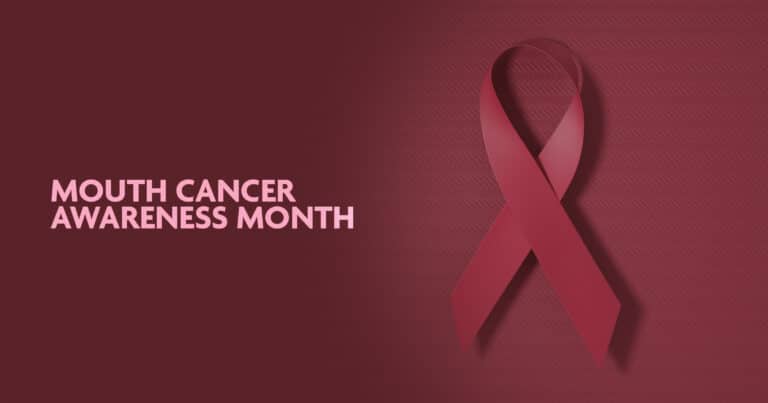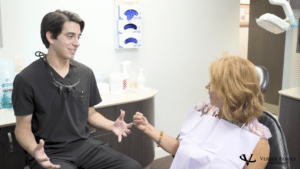According to the Oral Cancer Foundation, approximately 53,000 Americans will be diagnosed with oral oropharyngeal cancer in 2020. They estimate that it will cause over close to 10,000 deaths. In the late stages, this type of cancer can be life-threatening, which is why early diagnosis is so important.
Because early detection is the key to early-stage diagnosis, your dentist is an important health partner in oral cancer detection.
How is cancer detected by my dentist?
When you visit your dental office, your dental professionals are screening for mouth cancer. At your cleaning appointment, your hygienist performs a cancer screening and reports suspicious areas to your dentist before your exam. Your dentist also performs a cancer exam and will refer you to an oral surgeon if they feel the discovered lesion or bump should be tested. Those abnormalities can be tested through a biopsy, which can definitively determine whether cancer cells are present.
Because mouth cancer symptoms can often seem like other less serious conditions, it can be missed early, which is why self-awareness is so important. Self-examination is also a way to detect abnormalities as well. So, if you have a sore, lump, or pain that doesn’t go away in about two weeks, you should seek an examination by your dentist or physician.
Can mouth cancer be treated?
Yes, oral cancer can be treated like other forms of cancer.
Your oral surgeon can perform a biopsy and remove the abnormal lesion or growth. If it is determined to be cancerous, patients are referred to an oncologist, a cancer specialist. Typically, post-surgery treatment involves treatment such as radiation and/or chemotherapy.
Common Symptoms:
- Mouth or lip sores that do not heal after 14 days.
- Unusual red or whitish spots inside the mouth/tongue that cannot be wiped away.
- Unusual bleeding or pain inside the mouth/around gums.
- Lumps or bumps inside the mouth & lip or outside the mouth, head, and neck.
- Chronic sore throat or feeling of thickness in your throat.
- Voice changes or hoarseness.
- Trouble chewing and swallowing.
Common Risks:
- Age – Patients who are over the age of 55 are at higher risk.
- Gender – Men are at twice the risk as women.
- Tobacco Use – Tobacco users are 50 times more likely to develop oral cancer!
- Excessive Alcohol Consumption – Mouth cancer is more likely in people who drink alcohol vs non-drinkers. Some studies show that excessive alcohol users are up to 6 times more likely to get oral cancer.
- Human Papillomavirus (HPV) – Cases of oral cancer associated with HPV are rising, especially in younger people.
- UV Exposure – Cancerous lesions around lips are more common in those who have had excessive sun exposure from a young age.
In addition to common risk factors, new research is also finding that there may be links between oral cancer and poor nutrition, and poor oral health. So, regular dental visits can help not only detect but also help reduce your risk for oral cancer. Contact us today for an appointment!





